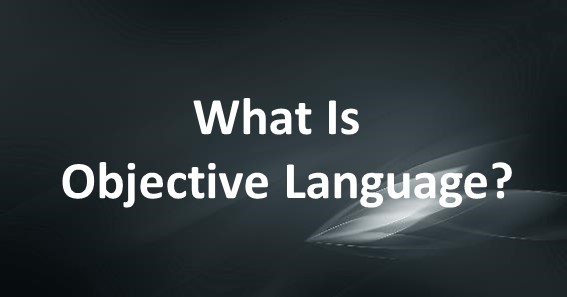Are you curious to know what is objective language? You have come to the right place as I am going to tell you everything about objective language in a very simple explanation. Without further discussion let’s begin to know what is objective language?
Language is a powerful tool that enables us to express thoughts, ideas, and emotions. However, the way we use language can significantly impact the effectiveness and clarity of our communication. Objective language, in particular, plays a crucial role in promoting unbiased and accurate communication. In this blog post, we will explore the concept of objective language, its benefits, and how it contributes to effective and respectful communication.
What Is Objective Language?
Objective language refers to the use of words and expressions that convey information in a neutral and unbiased manner. It focuses on presenting facts, observations, and verifiable data without injecting personal opinions, emotions, or subjective interpretations. The objective language allows for clear, logical, and rational communication, minimizing the potential for misunderstandings or conflicts arising from biases and personal perspectives.
Benefits Of Objective Language:
- Clarity and Precision: Objective language promotes clarity in communication by avoiding ambiguity and subjective interpretations. When information is presented objectively, it is easier for the audience to understand the intended message and accurately interpret the facts being presented. This fosters effective communication and reduces the chances of miscommunication.
- Impartiality and Fairness: Using objective language helps maintain impartiality and fairness in discussions and debates. By presenting information in a neutral manner, individuals can engage in a respectful exchange of ideas without feeling attacked or disrespected. This promotes open-mindedness and encourages a healthy exchange of diverse viewpoints.
- Credibility and Trust: Objective language enhances credibility and trustworthiness. When information is presented objectively, it carries a higher level of reliability and is perceived as more credible. This is especially important in professional settings, where accurate and unbiased communication is crucial for building trust and maintaining professional relationships.
- Problem Solving and Decision Making: Objective language plays a vital role in problem-solving and decision-making processes. By focusing on facts and data, individuals can analyze situations objectively, evaluate different options, and make informed decisions based on evidence rather than personal biases. This approach improves the effectiveness of problem-solving efforts and reduces the risk of irrational or impulsive decision-making.
Tips For Using Objective Language:
- Avoid Personal Opinions: When communicating objectively, it is important to refrain from inserting personal opinions, emotions, or biases into the discussion. Stick to presenting facts, data, and observable information rather than personal beliefs or preferences.
- Use Clear and Concise Language: Opt for clear, precise, and unambiguous language when conveying information. Avoid vague or subjective terms that can lead to misinterpretation. Be mindful of using qualifiers or exaggerations that can distort the objectivity of the message.
- Provide Evidence and Examples: Whenever possible, support your statements with evidence, statistics, or examples that can be verified and corroborated. This strengthens the objectivity of your message and provides a solid foundation for discussion.
- Consider Multiple Perspectives: Acknowledge and consider alternative viewpoints when discussing a topic. This demonstrates a willingness to engage in a balanced and objective conversation and fosters a spirit of open-mindedness.
Conclusion:
Objective language is a valuable tool for effective and respectful communication. By focusing on presenting facts, observations, and verifiable information in a neutral and unbiased manner, we can enhance clarity, fairness, and credibility in our interactions. Whether in professional settings, academic discourse, or everyday conversations, practicing objective language allows us to communicate with greater precision, foster understanding, and build stronger relationships based on trust and respect.
You can collect more information about such topic onHowtat
FAQ
What Is An Example Of Objective Language?
Consider this statement: “This brand of shampoo does not contain petroleum products and is not tested on animals.” The language in this statement is objective and focuses on facts that can be proven about this particular brand of shampoo.
What Is An Example Of Objective Writing?
Use passive language: Objective writing typically makes use of passive language, as passive language removes the actor from the sentence. For example, instead of saying ‘I conducted the necessary research’, say ‘the necessary research was conducted. ‘
What Is An Example Of Objective And Subjective Language?
Objective: It is raining. Subjective: I love the rain! Be objective when writing things like summaries or news articles, but feel free to be subjective for arguments and opinions.
What Is Objective And Example?
An objective is something you plan to achieve. A military objective is the overall plan for a mission. The objective for a bake sale is to raise money. If your objective is to learn a new word, you have succeeded. An objective is the point of something.
I Have Covered All The Following Queries And Topics In The Above Article
What Is A Language Objective
What Is Objective Language Examples
What Is Language Objective
What Is An Objective Language
What Is Objective Language In Academic Writing
Objective Language Examples
What Is Subjective Language
Subjective Language Examples
What Is Objective Language In Writing
Subjective Language Sentence Examples
Which Of The Following Types Of Publications Usually Use Objective Language
Objective Writing Examples
Objective Versus Subjective Language
What Is Objective Language
What is objective writing examples
